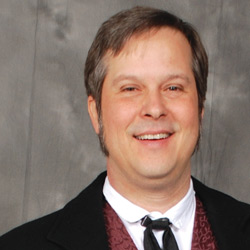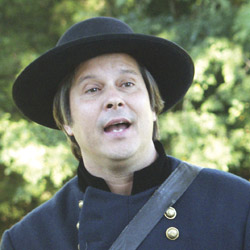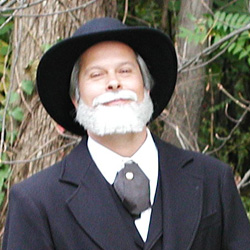To celebrate the 200th birthday of Abraham Lincoln, Brian "Fox" Ellis has developed four programs, excerpted here, that look at the life of our 16th president from different perspectives.
AUSTIN GULLAHER
Lincoln’s Childhood Friend
Gullaher was born in Kentucky in 1807, two years before his childhood friend, Abraham Lincoln. The Gullaher family also settled in New Salem, Illinois, just a few years before Lincoln arrived.
I grew up near Knob Hill, Kentucky, two miles from the Thomas Lincoln Homestead. And when we was young, Abraham Lincoln and I was best friends. I remember it like it was yesterday…Abraham was seven, and I was nine.
Our favorite place to play was Knob Creek. Usually it was just ankle-deep, a fun place for a couple of boys to catch frogs or s-s-ssnakes-s-s. But on the morning I am remembering, with the snow melt and spring rains, Knob Creek was way up over its banks, over your head, flood stage! Abraham and I was walking along the shore when we come to a place where there’s a log fallen across the creek.
Abraham says, “Austin, looky here, I’m gonna walk across that there log.”
I said, “Abraham, I would not do that if I was you. You know and I know that you can’t swim, and neither can I. And with all of that rain, that log’ll be slippery, you’ll slip. You’ll fall. You’ll die!”
Now, I have to ask, have you ever done something just ‘cause someone told you not to? You can all guess what happened next, sure enough, he starts walking across that log. He puts one foot in front of the other, he gets about halfway across, and you can all guess what happens next, sure enough, he falls in. The river just washes him away! Help! Help!
Well, I don’t know what to do. I don’t know how to swim. But I can’t just stand there. I got to do something. So I start running along the side of the river. Then I realized his life was in my hand, quite literally, for I grabbed a hold of a sycamore, a young dead sapling, and it snaps off in my hand. I run up ahead and yell “grab hold, grab hold!” He grabs onto the stick and I pulled him out. I saved his life! Sure enough! If not for me, he would‘ve never been president. Thank you very much!
Now, when you save a man’s life, you take a special interest in that life, so I spent the rest of my life collecting stories about Abraham Lincoln…
Abraham had very little formal education. As he liked to say, he attended school in fits and starts. Most of what he learned he taught himself reading. As he would tell it, he would often read while he was plowing. He’d line the horse up on a tree at the far end of the field, send the horse on his way. The horse knew what to do, so he would crack a book across the plow and read as he walked along. He always ended this story by saying, “I would rather have my nose in a book than a horse’s behind.”
 BILLY HERNDON
BILLY HERNDON
Lincoln’s Law Partner
Herndon wrote one of the most important and controversial biographies of Lincoln. He conducted dozens of interviews with many others who knew Lincoln personally.
As I am sure many of you well know, Mr. Lincoln and I shared an office above the general store on the square in Springfield, across from the old courthouse. Some say I was Lincoln’s junior law partner, but in complete humility, I must say he always treated me as his full partner from Day One, and every penny that came into our office was split evenly, 50/50.
Though we were partners for more than 21 years, I had known Abraham since I was a young boy. My father ran an inn in Springfield, the Indian Queen, where Lincoln would be an infrequent guest. My father, though an ardent Democrat, worked closely with Mr. Lincoln as one of the “long nine” to move the state capitol from Vandalia to Springfield. And long before that, when Lincoln ran a general store in New Salem, he worked with my cousin Rowen Herndon on the steamboat, the Talisman.
Mr. Lincoln encouraged me to study for the bar and arranged for me to clerk in the Law Offices of Logan and Lincoln. When Lincoln and Logan’s partnership dissolved, knowing there were a dozen men more able, Mr. Lincoln invited me to be his full partner, though I had only recently been admitted to the bar.
There are hundreds of stories I could tell about Mr. Lincoln’s youth, his courtship with Ann Rutledge, and his life in politics, his struggles in the Civil War…but knowing other men have spoken ably on these topics allows me to limit my time to the arena where I knew him best: Abraham Lincoln the Lawyer.
One time a would-be client asked Mr. Lincoln to help with a case involving six hundred dollars. But if we won, it would ruin a poor widow woman and afflict her six children. “We shall not take your case, though we can doubtless gain it for you,” responded Lincoln. “Some things that are right legally are not right morally. But we will give you some advice, for which we will charge nothing. We advise a sprightly, energetic man like you to try your hand at making six hundred dollars in some other way.”
 MATHIAS STRITT
MATHIAS STRITTCivil War Veteran*
I won’t soon forget that morning, April 12, 1861, when General Beauregard fired his cannons on Fort Sumter. The roar of that cannon echoed from the bay of Charlestown across the Alleghenies, to the Rockies and around the world, drawing the eyes of tyrants who scoffed at our experiments in liberty and democracy.
I was born in Wurttemberg, Germany in 1821, and my family immigrated to Wisconsin in 1830. I soon learned to love this land. It offered opportunities unknown to a German peasant who still struggled under a baron who treated his subjects as little more than cheap labor. When I was 40, I moved to Peoria to work for the Peoria Plow Works where my skills with steel were valued.
*Parts excerpted from Lest We Forget by John Martin. Used by permission of his grandson, Robert Albrecht.
 WALT WHITMAN
WALT WHITMANPoet, Journalist
Lincoln was a known admirer of Whitman’s Leaves of Grass. Whitman’s most famous poem, “Oh Captain, My Captain,” was written as a eulogy for the martyred hero.
I am proud to tell you that Abraham Lincoln knew this book of mine, Leaves of Grass. One of his young legal clerks reports that Lincoln read aloud from its pages in his law office in Springfield. We do know that his partner, William Herndon, had one of the better personal libraries in Springfield.
came into the office.


